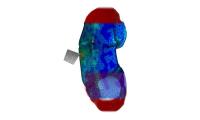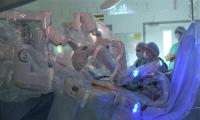News
AI versus cancer - the Cambridge researchers using machine intelligence to beat disease
15 Jul 2024
‘Game changing’ technology which can predict how patients will respond to cancer treatment is part of a wave of Cambridge research harnessing AI to fight the disease. Read more below:
New microbiome insights could help boost immunotherapy for a range of rare cancers
1 Mar 2024
A person’s microbiome can aid treatment for multiple different cancer types, allowing researchers to develop microbial tests or treatments to help support immunotherapy in the future.
Get hands-on with cancer research in Cambridge!
12 Feb 2024
Join us on Saturday 16 March from 11am – 4pm for the Big Biomedical Campus day at the Cambridge Academy for Science and Technology.
Kidney Cancer Awareness Week Breakfast Meeting
7 Feb 2024
All are welcome to join us on Wednesday 7 February at 08:30 in Seminar Room 1, Clinical School to hear from Grant Stewart and Hannah Harrison.
Technology for improved cancer patient outcomes
9 Jun 2023
Cambridge partners with the University of Strathclyde to develop ‘Digital twins’ – exact computer models of patients – to enhance cancer patients’ recovery times following surgery.
Junior Investigators attend Leicester meeting
8 Feb 2023
Annual Junior Investigators Network Group meeting held in Leicester on 6 and 7 Feb 2023
New hope for kidney cancer using existing drugs
23 Nov 2022
Cambridge researchers have discovered that a drug given to lung cancer patients could be used to treat renal cell carcinoma, a cancer with a high mortality rate that is hard to detect.
Prostate cancer cases risk late detection due to misleading urinary focus
4 Aug 2022
A review by Cambridge researchers argues that not only is this unhelpful, but it may even deter men from coming forward for early testing and detection of a potentially treatable cancer.
Home in a day after robotic prostate cancer surgery
29 Jul 2022
A surgical robot at Addenbrooke’s is helping to cure patients with prostate cancer, enabling them to go home less than 24 hours after surgery.
Review of kidney cancer management
26 Jul 2022
Urological Malignancies Programme Co-lead Professor Grant Stewart authors seminal review of kidney cancer management.





























